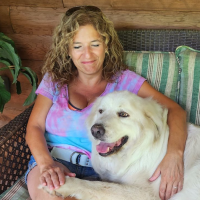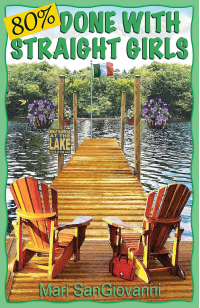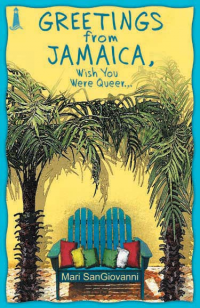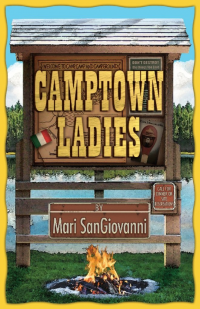Genre:
Contemporary Romance Romance Women's Fiction LGBT Humor- Country: United States
- Books: 4
- Profession: Author, Filmmaker, Designer
- Member Since: May 2024
- Profile Views: 1,566
- Followers: 70
- VISIT AUTHOR: Website, Facebook, Twitter, Instagram, Amazon,
Author of Greetings from Jamaica Wish You Were Queer, Camptown Ladies, 80% Done With Straight Girls, and Liddy-Jean Marketing Queen.
Filmmaker, screenwriter & director: The Sibling Rule (streaming on www.Lesflicks.com), Retreat (in post-production)
Mari SanGiovanni's Books
Stay in the loop on books by Mari SanGiovanni. See upcoming and best-selling books by the author here. You'll also find the deals on books by Mari SanGiovanni.
** Please note that the information or price displayed here may not be the updated. Make sure to double-check the latest book price before buying books.
** Also, there might be other books by Mari SanGiovanni not listed on AllAuthor.
| Book |
|---|
80% Done With Straight Girlsby Mari SanGiovanniPublish: Jul 26, 2022Contemporary Romance New Adult Romance Romance Women's Fiction LGBT Humor more» |
Greetings from Jamaica, Wish You Were Queerby Mari SanGiovanniPublish: Nov 01, 2006Series: Santora FamilyContemporary Romance New Adult Romance Romance Women's Fiction LGBT Humor more» |
Camptown Ladiesby Mari SanGiovanniPublish: Nov 01, 2022Series: Santora FamilyContemporary Romance New Adult Romance Romance Women's Fiction LGBT Humor more» |
Liddy-Jean Marketing Queenby Mari SanGiovanniPublish: Jun 11, 2024Contemporary Romance Romance Women's Fiction LGBT Humor |
Mari SanGiovanni Interview On 17, Sep 2024
 "Mari SanGiovanni is the acclaimed author of "Greetings from Jamaica Wish You Were Queer," "Camptown Ladies," "80% Done With Straight Girls," and "Liddy-Jean Marketing Queen." As a versatile storyteller, Mari also excels in filmmaking, screenwriting, and directing. Her work often explores themes of identity, relationships, and LGBTQ+ experiences, bringing fresh, witty, and insightful narratives to both the page and screen."
"Mari SanGiovanni is the acclaimed author of "Greetings from Jamaica Wish You Were Queer," "Camptown Ladies," "80% Done With Straight Girls," and "Liddy-Jean Marketing Queen." As a versatile storyteller, Mari also excels in filmmaking, screenwriting, and directing. Her work often explores themes of identity, relationships, and LGBTQ+ experiences, bringing fresh, witty, and insightful narratives to both the page and screen."
Humor and love are always my driving force to write anything! Even when I’m writing about a sad subject, I think there’s always an opportunity to look at things in a way they could still entertain the reader, at least that is my hope!
In "Greetings from Jamaica Wish You Were Queer," how did you balance the portrayal of cultural identity with LGBTQ+ themes?This was my first book, and I had no idea it would become a trilogy. The story is entirely fiction, but the characters are loosely based on my Italian family, and since my own family is wildly entertaining, I’m hoping that translated in my books! I’m throwing out a stereotype here, but I think Italians truly speak what they are feeling and that is a tremendous vehicle for humor! Truthfully, being gay can also bring a lot of humor, so…why not merge the two! Greetings From Jamaica Wish You Were Queer was published back in 2007, and at that time there were not too many romcom type LGBTQ books. There certainly is a lot more now, but when I first wrote it was pretty edgy in the humor and off color language. I’m not a very politically correct person if I think something will be amusing, I will say it or write it, and this can be risky at times! Luckily, I found readers who enjoy that type of storytelling and only got one angry email!
Can you discuss the process of creating relatable characters in "Camptown Ladies" and what you hope readers take away from their stories?The second book in the trilogy, Camptown Ladies, was based on an idea my sister and I would often talk about someday owning a campground and catering to a gay clientele. That idea always stuck with me so when I decided to write book 2 in my series, I wanted a unique setting to follow the Caribbean setting in my first book, so it provided the perfect vehicle for that. I wanted to take some risks with fun stereotypes of the gay and lesbian people I have known, hoping that people would enjoy it for what it was, good-natured fun. However, in all my books there is a serious side, because life can be difficult and I like to explore those themes. Love, loss, and family relationships can be both wonderful and challenging, and I like to walk the line between romcom and drama, because these are always the novels and films I like to read and watch.
What motivated you to write "80% Done With Straight Girls," and how do you think it contributes to the LGBTQ+ literature landscape?I had had a terrible loss in my life when I decided to write that book. I had just lost my partner of 14 years and I thought writing a third book in the series might somehow save me. Unfortunately, I was not healed enough to write the third book at that time, and I put it aside for many years, from 2011 all the way to 2023 when it was finally published. I needed the time to heal before I was able to write about love again. I hoped when I wrote it that even though there are themes in the book that deal with sadness and loss, there could still be humor throughout, just like in real life, I hope that the book is a balance of joy, sadness, humor, lust… Etc.!
In "Liddy-Jean Marketing Queen," how did you blend humor and satire to address the world of marketing and its quirks?I think we have all had experiences in the workplace which can be both frustrating and hilarious. Anytime you bring a bunch of people together that normally would not be spending so much time together, I think there’s an opportunity for humor and drama! in Liddy-Jean Marketing Queen I wanted to tell the story from the point of view with someone who has intellectual disabilities, and what the workplace could look like from their perspective when things are not going very well. I was inspired by the people I have known in my life with Down syndrome and other challenging disabilities, like my nephew, Luca. I wanted to explore the challenges but equally I wanted to explore the joy and humor because getting to know someone with IDD (intellectual and developmental disabilities) is an amazing opportunity to see the world differently. The main character in the book, Liddy-Jean, sees the world differently due to her disability, however, in so many ways she is smarter than all the people around her when it comes to the most important things in life, love, friendship, family and behavior workplace. She understands that love is love, and everyone should play nice with each other!
Do you find writing for different genres challenging, and if so, how do you approach each project differently?I love a challenge! I would have to say my trilogy is written in the same style because it is a continuing story, but the screenplays I write are very different. However at the core, if I’m not writing about love, I’m not writing! That love story could be sad, tragic, or hilarious, and because I believe the meaning of life is love, this will always be a part of what I explore and write. Writing Liddy-Jean was the biggest challenge because I wanted to write the book honestly but needed to make sure I would not unintentionally offend anyone, and when you are writing humor that can be very tricky! Luckily, I had a few trusted readers with more experience than I had in the world of people with intellectual and developmental disabilities, in order to make sure I was being realistic in the story and not cross the line with the humor.
How do your personal experiences influence the themes and characters in your books?My personal experiences completely shape what I write! The story will be fictional, but there are bits and pieces of things I have experienced or learned through life in each of my stories. I admire writers who can be 100% writing fiction, but that is not me. I have always needed to base my characters on people that I have known. My latest book, Liddy-Jean marketing queen, is based on a frustrated moment I had in a company I worked for a long time ago. I didn’t like the way the employees were being treated, especially the women in the company. One day when I was at a low point thinking I should leave that company (which I eventually did) and I was walking down the hallway when I glanced into the marketing department. My eyes locked with a young woman who was working there. I knew she had Down syndrome and that had been working in the office for quite some time helping with some office tasks, like stuffing envelopes. I wondered what that workplace looked like from her perspective, and the idea for the novel was born in that moment.
What was the most challenging aspect of writing your latest book, and how did you overcome it?Although I had some limited experience working with young adults and children with disabilities when I was a young person, I feared didn’t know everything I would need to write a story like this. My publisher, at Bywater Books, strongly encouraged me to enlist the help of some readers who had more experience than I did. It was such great advice. It was important to make sure the story would not unintentionally offend anyone. I learned that while personal experience and research is important, getting other people’s perspective on sensitive issues like this was crucial.
How do you approach character development, especially for complex or unconventional characters?I went to school for art at Rhode Island School of Design and the training I had there is similar to how I approach writing. In drawing and painting, I base what I see in reality, something that I can observe so I can latch onto the details. Just like a painter might use a photo, or study her subject in real life, I find for me that writing has to have that same real observation. Not to say that I don’t use my imagination to completely come up with the storyline, but the characters definitely have pieces of people that I know. I think it’s especially true when writing comedy. If I’m basing a character on my sister, at any given point in the story I know what outrageous thing she will say, and would also know the character that might be loosely based on me, exactly how she would react!
What role do you think representation plays in your writing, and why is it important for you?What a great question! The simple answer for me is that it’s important to me because I’m over 50, so while I was growing up I had absolutely no representation, especially in films and television, and very little in books that I could actually get my hands on. this was before the Internet and before Amazon could ship anything anywhere. I remember my sister and I would have to cross over from Rhode Island to Boston, Massachusetts to see the one lesbian film that was playing every five or eight years… This can make you feel like you are sneaking off to do something that is wrong.
I started writing novels because I eventually wanted to make them into films, but it took me until well after my 50th year to figure out how to do that! Long term, without big production companies willing to put money behind niche projects like these, most Indie filmmakers can’t personally fund these projects more than one or two times. I have watched a lot of straight movies that I have enjoyed and it’s my hope that at some point love really will be love when it comes to films and books! I can see where there may be a time where more people will enjoy reading and watching all different viewpoints when it comes to families, love and romance depicted in novels and the entertainment industry.
In "The Sibling Rule," how did you develop the narrative to capture the emotional dynamics of sibling relationships?I was so lucky in the two young actresses I have in the film! They had a wonderful chemistry as friends and new sisters, which I feel came across on screen. Early in the screenplay, one of the mothers mentions that both of their children have lost so much in each of their divorces. I thought it was important to show that loss from a kid’s perspective which would have the audience rooting for this new family, even if the marriage was not supposed to be real when it first starts. Unfortunately I could not make a full feature length film. What I ended up with was a “long short” at 51 minutes long. The feature version of the screenplay has a great deal more of the dynamics between the two kids. Someday, I hope a big production company will use my film as a proof of concept for a full version of the film where there would be more time to show the character growth in those young siblings.
Can you share some insights into the process of directing and screenwriting for "The Sibling Rule" and "Retreat"?My first film started with a germ of an idea, many years ago, when gay marriage was first allowed in the UK. I saw a news story about two women who got caught faking a marriage in order to get health insurance, and at that moment, I thought, what if the marriage turned real? For my second film, I was a little bit more practical, I had the location first because I always thought my sister‘s log cabin house looked like an amazing place to have a women’s retreat. For this film I wanted to have a more serious subject matter, but I wasn’t sure what it was going to be until I had a conversation with a close friend who was one of the actresses in my first film. It was during our first project together that she told me a tragic story regarding her son. I couldn’t believe how strong she was, how resilient to have survived the tragedy. I don’t know what possessed me to do so but I asked her right then if it would be OK if I loosely based something along her story and if I did, would she be in my second film? I wasn’t sure if she would be able to do it since the loss was so close to home, but she agreed right away. The story I wrote was quite different, but still involved the death of a young person, of whom she would play the mother. Her acting in that film is some of the best I’ve ever seen, such a courageous performance and the actress I found to play opposite of her was perfect in the role, playing a character who is deeply flawed yet empathetic, it made for some amazing scenes.
Writing the film to me is the easiest part, it’s the scheduling, the shooting of the film and the long editing process That is the most challenging. I have a full-time corporate job so the editing for me has stretched out to between nine and 12 months to fully complete the projects. At that point you’re still not done, then you have to market the film and enter it into film festivals, hoping to get noticed for a distribution deal. my film was not discovered at the film festivals but the awards we won gave it enough attention where I was able to get a streaming service interested and it is now streaming on Lesflicks, streaming service devoted to lesbian indie films.
How do you balance your work as a filmmaker with your writing, and do you find any crossover between the two mediums?Balancing my full-time job as a product development professional is actually the balancing act that is the trickiest! Having a full-time corporate job, writing novels, screenplays, and making films is pretty much a full plate!
I have more screenplays than I do time or money to make the films. So, my next focus will be getting film projects made with a larger production company, or by crowdfunding.
It is always been my dream to have all my novels be films or a tv series, but they are not the low budget stories that my tiny film company, Love is Love Productions, would be able to make myself. That’s why my first two films are not based on my books, but standalone projects. A large production company with name actresses would have to make Liddy-Jean Marketing Queen.
I was blown away by the film Temple Grandin, an Oscar winning film which was about a person who thinks differently than most other people, but no less successfully! I think there’s room enough for another film with that general concept, somebody just has to have the courage to make it!
Who or what introduced you to AllAuthor? How would you describe your experience so far?I found your company online, I believe it was on Twitter X. All Author is a unique and impressive way to market books! I love that All Author offers graphics that you can place on your social media, although that is not my biggest challenge because I am a graphic designer. What I find is the biggest challenge is growing the social media presence to get more eyes on the posts that both the authors post and also that All Author posts. It is hard to get seen in a very congested environment like Twitter X.
If I had any suggestions on what All Author could do next, it would be to link up with book bloggers, booktok, or Instagram book influencers with virtual interviews like this one. This way there could be a growth on all sides (All Author, bloggers, writers) by sharing the content, so more people can see the posts. Growing an audience is definitely the challenge of social media, not an easy one for sure!
Ask Mari SanGiovanni a Question
Have brimming questions to ask author Mari SanGiovanni? Ask whatever you like, but keep it appropriate.
** Please note that unanswered questions will not appear on the page. Refrain from posting promotional messages.





